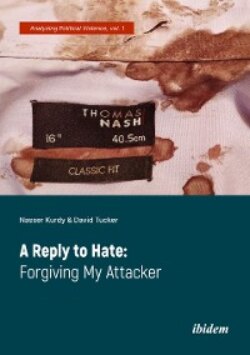Читать книгу A Reply to Hate: Forgiving My Attacker - David Tucker - Страница 4
Foreword
ОглавлениеDavid Tucker
I first met Dr Nasser Kurdy in February 2019, where myself, Matthew Feldman and Amjid Khazir, the three of us representing Academic Consulting Services Ltd. (www.academicconsulting.co.uk), The Centre for Analysis of the Radical Right (www.radicalrightanalysis.com) and Media Cultured (www.mediacultured.org), had collaborated with Shazia Awan of Manchester City Council on a counter-extremism event for school pupils which was hosted by Manchester Metropolitan University. At the event, experts spoke on prejudice, extremism and violence, and there were two survivors of extremist violence discussing their experiences. One was Ahmad Nawaz, who on 16 December 2014 in Peshawar, Pakistan, was shot by the Taliban in an attack on his school; 150 students were brutally massacred that day along with teachers and educationalists. Amongst those murdered was Ahmad’s brother, Harris. Ahmad survived the attack and has since become an ambassador for education and peace working across the world. The other invited speaker was Dr Nasser Kurdy. On Sunday 24 September 2017 Dr Kurdy was stabbed in his neck as he was entering his local Islamic Centre in Altrincham, Greater Manchester. Dr Kurdy did not see the attacker coming, and he has only been able to speculate as to why he was the victim of this sudden, awful, and life-altering split-second attack. Nevertheless, through all the physical pain, the confusion and at times fear engendered by this attack, Dr Kurdy managed to come through it in just a matter of hours and profess his forgiveness of his attacker. Further on in the book Dr Kurdy discusses how he has thought about distinguishing between the forgiveness of an attacker and the forgiveness of an attack itself. For now, it suffices to say that it is very much this reflectiveness that comes through when meeting Dr Kurdy, a thoughtfulness always combined with good humour and kindness, a personality that has been brought to bear on the more impersonal abstracts of crude violence. It is of relevance throughout that, in telling contrast to his kitchen-knife-wielding attacker, Dr Kurdy is a surgeon. He brings his medical expertise to bear in fascinating ways on his own injury and in thinking about the implications his analysis has, or could have, for a criminal investigation and trial. In a sense, this book is a story of two users of knives, and the contrast between how the two deploy their respective tools tells us something about extremist violence and possible responses to it.
Dr Kurdy has been telling the story of his attack and forgiveness to many different audiences since, and by 2019 had started to think about setting it down on the page, so we discussed what such a project might look like. For one thing, Dr Kurdy is very busy as an orthopaedic surgeon, and he did not feel he could simply write the book himself. We decided, therefore, to conduct interviews, with the intention being that much of the book would be told in the first person, in Dr Kurdy’s voice, as well as I could capture and edit it for the page. Chapters 1 to 10 are derived from this methodology; they are Dr Kurdy’s voice, as spoken in interview, then transcribed and edited, with the interviewer’s voice removed along the way. However, we also wanted to include some more discursive work, some evidence of the conversational way in which much of the book had come about. To that end, Chapter 11 retains its interview format in order that the wider-ranging and reflective discussion therein, which looks back on the events of the preceding chapters, explores current projects Dr Kurdy is engaged in and looks forward, could be presented in a way closer to how it came about.
Towards the end of the book are shorter contributing texts by other people also affected by the attack. Family, friends and colleagues lay out how events had both short-term and longer-term effects on themselves as well as on the protagonist. These contributions set out multifarious manifestations of what Dr Kurdy has come to call in recent work with prison inmates a “ripple” effect, referring to the ramifications across a range of people that a single traumatic event will inevitably have. It is often a cliché to say that an attack is an attack on a particular “community”, especially if such an act might very well be intended as precisely just such a synecdoche. But it is not only a British Muslim community in general that these interspersed voices speak for, but also for the personal, familial and multi-faith community close to the person at the centre of these events.
Dr Kurdy always wanted the concept of forgiveness to be at the centre, the heart, of this book. In this very intention he even perhaps unknowingly spoke about his thinking of, his hopes for, other people. The book is less a record of events for Dr Kurdy to retain as memory might fade, times change, as priorities and focuses shift. I believe, though it has never been articulated as such throughout the process of producing this book, that the hope can be that the events surrounding this particular act of extreme violence might bring about some good, whether that is in speaking to others in comparable circumstances, or in filling out the academic records, for those producing policy as much as for those producing research, of what can happen following such an act. Personally speaking, it has been inspiring to see how an act of hate has been turned to good in such a way as described in the chapters that follow.
